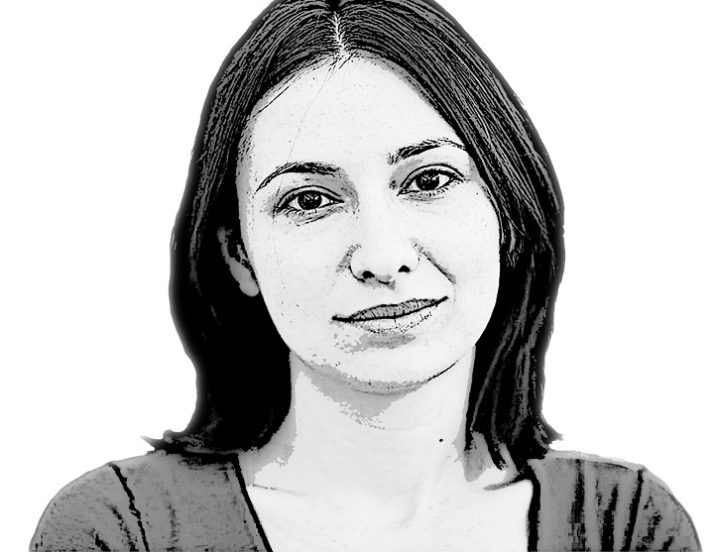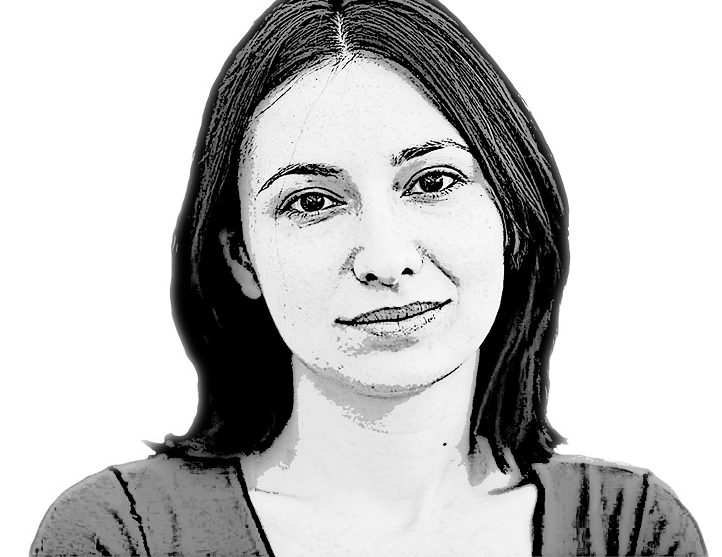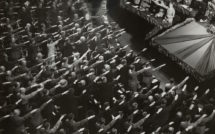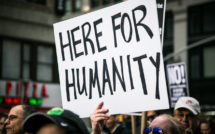

In January 2017, the award-winning Russian-American writer Sana Krasikov published her first novel, The Patriots. The book is a sweeping multi-generational saga spanning eight decades, and revolving around the family of Florence Fein, an American woman disenchanted with the Great-Depression-era United States. Florence follows her lover to the Soviet Union in the 1930s, and finds herself trapped, eventually falling victim to Stalin’s purges. Yet, even after her years in the Gulag, Florence maintains her idealism for the Soviet mission. But, her son, Julian, rejects it, immigrating to the United States in the 1980s. The story, told from the perspectives of both Julian and Florence, explores the contradictions of human idealism, the cultural divides perpetuated by propaganda, and the ability to live in multiple realities at once. It is particularly relevant in the context of current political developments.
Krasikov immigrated to the United States in 1987 from the Soviet Republic of Georgia. Her critically-acclaimed debut short story collection, One More Year, was published in 2008. She was named one of Granta’s Best Young American Novelists of 2017. I spent an afternoon with Krasikov in the Hudson Valley discussing her novel in the context of the recent global paradigm shift, and Russian-American political attitudes.
—Masha Udensiva-Brenner for EuropeNow
EuropeNow All of your short stories are based on the lives of people you know, was that the case with The Patriots?
Sana Krasikov Yes, this novel is based on Timothy, a good family friend of ours. This really cool older man I’ve always admired. His mom and dad were both Americans, they’d left on their own and were among this influx of enthusiasts who’d come to the Soviet Union in the ‘30s. I always found this story fascinating. Timothy lives in the U.S. now, and seems like such a Soviet immigrant to me, but he was actually born to American parents. When I first interviewed him about this years ago, I learned that he and his brother ended up in orphanages because his parents were pulled into the meat grinder of these purges. And I remember asking, “what was your mother in for?” And he looked at me like I was a complete idiot and said, “Well, she wasn’t in for anything. For you to ask that question means that you don’t understand Russia.”
EuropeNow How did you feel about that?
Sana Krasikov I liked it. I like when I realize that I’m not getting something. Because it means there’s something interesting to write into.
EuropeNow I think it’s really apt that you chose to call your novel, The Patriots. Patriots is such a loaded word both here and in Russia.
Sana Krasikov Well, actually, my editor chose it. I’m one of those people who doesn’t come up with a title for anything I work on until the very end. When the book was completed, we were throwing out titles and this one really resonated with something in the book. Julian and his mother Florence subscribed to very different definitions of patriotism and that was very much at the heart of their rift.
Florence leaves the United States during the Great Depression, a time that can seem very familiar to us now because in addition to being a time of economic hardship, it was also a time of major social rifts. That was what I found most interesting while researching the book. People who left the U.S. were not necessarily economically desperate, they just felt like the prolonged stagnation was fueling all of these social divisions. And Florence subscribed to a very progressive definition of patriotism, where you hold your nation to its promises; the promises of equality and inclusiveness. So, she leaves the United States and goes to Russia because she feels that the idea of America is not happening in America. She goes to a place where she thinks it is happening.
But, you know, for someone like her son Julian, who grew up in the Soviet Union, the idea of equality and inclusiveness is not really all it’s cracked up to be. Everyone is supposed to be equal, but, first of all, they’re not, and second of all, they’re all equally miserable. So, I think that the basic idea is that Julian and Florence, their frames clash. Their definitions of what it means to be loyal to a place are totally different. And the battle for what a patriot is, for what that word means, I think we’re seeing that battle every day now. People really subscribe to different definitions of it.
EuropeNow In what ways?
Sana Krasikov Well, I am by no means a radical. I’m kind of apolitical in many ways because I’m a writer, I’m an aesthete, I’m not like an activist writer. But my kids’ Russian nanny, she tells me, “you are not a good patriot.”
EuropeNow A good patriot to the U.S.?
Sana Krasikov Yeah, to the U.S., which is so crazy for me because I feel like compared to my friends, I am the biggest defender of the United States. But, the idea that I would even criticize our government, given that I was given respite by it, that I was an immigrant, for her, that reads as unpatriotic. It’s this idea that you are supposed to be loyal to whoever is in power.
EuropeNow And that’s a very Russian idea…
Sana Krasikov Totally, I mean she’s an older woman. She just kind of represents how people of a certain generation talk.
EuropeNow It’s this simultaneous sense of loyalty to whomever is in power, combined with a mistrust for authority in general.
Sana Krasikov It’s not that you’re a part of the system, you should be grateful for what they’re giving you.
EuropeNow You have a lot of interesting observations in your fiction about Russians who immigrate to the United States, and the cultural differences they observe upon returning to Russia after having some time away. Can you discuss the experience of return?
Sana Krasikov Maybe I can talk about it in a slightly different way. My husband [NPR’s Gregory Warner] is actually working on this podcast [Rough Translations] that’s all about looking at something that we think of as a typical American experience, and then taking it abroad and seeing it as this reflection of something that we take for granted. Making us question our assumptions about what an experience is or should be when you are seeing a version of that experienced abroad. He did one story, for example, on race in Brazil, and on African Americans who have gone to Brazil and experience it in a completely different way. In ways that were actually liberating at first, but also really disturbing after they’d been there for a while.
EuropeNow That makes me think of the novel Americanah, where a Nigerian woman comes to the U.S. not thinking about race at all, then quickly becomes aware of the racial dynamics here, and is able to shed light on them as an outsider.
Sana Krasikov That’s a great book. I think we’re able to talk to each other much faster now because of technology, but we’re also misunderstanding each other at a faster pace. There is this sense that we can talk to each other more easily, but we’re living this experience where we can misunderstand each other more in spite of that. And it’s been happening for a while now, but I think we had this cataclysmic shift last year that has made us suddenly so aware of it and now we’re trying to figure out our relationship to it. And, you know, people were saying about my book, which deals a lot with these same issues, “well, she couldn’t have predicted this, she just got really lucky.” And it’s true, I didn’t know Trump would be elected, but I did feel like I was writing into a cultural divide that was happening right in front of me.
And, being Russian, I knew a lot of people who voted for Trump. I literally felt like I was between two different worlds. My friends were saying one thing, but my extended family was saying something else and they were fundamentally misunderstanding each other. It wasn’t like a disagreement, it was like they were speaking two different languages, living in parallel universes.
EuropeNow Watching different news, understanding the world in a completely different way.
Sana Krasikov Right. But I couldn’t completely write off the Russians. I really couldn’t. Because I felt like what they opposed wasn’t so much the politics, but the language the left had started using. I think to them, everything read as cultural Marxism. And I think identity politics to them reads as cultural Marxism.
EuropeNow What do you think about identity politics?
Sana Krasikov I think it’s really problematic. Look, it’s hard, because it’s not like I don’t think there’s structural racism and I don’t think there are things happening on the societal level that we shouldn’t be looking at and addressing. But I think the language that we are using to address a lot of it is for one, not accurate, and two, because it’s sort of being filtered through academia, is cultural Marxism.
EuropeNow What do you mean?
Sana Krasikov This idea of this united front against some kind of white cis male patriarchy, I don’t think that’s actually a very productive way to solve the problems of social injustice. To create this boogeyman, to create this enemy.
EuropeNow What do you think is a more productive way?
Sana Krasikov When people do talk about structural inequality that’s fine. But some of the shortcuts we use are too easy. There’s all this breast-beating. Everyone wants to be an ally and, it reminds me of the ‘30s, because the only way is to foreswear any allegiances to this bourgeoisie oppressor. If you’re a white male, then automatically you’re sort of suspect. But that’s just not the way it works. Life is so much messier than that. For a fiction writer to hear people talking like that, it just sounds so simplistic.
EuropeNow And in what ways does that remind you of the ‘30s? Can you connect some of what you’re describing to what’s happening in your novel?
Sana Krasikov There are so many scenes in the book, based on oral histories I’d read, when Soviet professors are taken to task for being insensitive and then they basically give these public apologies that use the language of Marxist self-correction, like, “I’m correcting my errors, please help me correct my errors.” Some of the public apologies from administrators and professors today sound exactly like that. “I apologize for my errors, I will now listen to my betters.”
EuropeNow So, in other words, you think this kind of attitude eliminates the avenues for engagement?
Sana Krasikov Totally. For instance, when people say that someone’s committing a microaggression. And there’s this idea that someone can say something that invalidates your experience, and when people respond, “it shouldn’t be my responsibility to explain to you why your view is offensive to me.” Like, yes, it is your responsibility. In fact, if you are a person who is in a position where they are being humiliated, it is totally your responsibility to speak up. I mean look, I do believe in making places more friendly for students. But some of the ways in which people just don’t want to engage with the messiness of defending their positions closes avenues for dialogue. And the language they use to close those avenues is taken straight out of the cultural Marxist manual. It’s not like they’re inventing this language. It came out of those thinkers.
EuropeNow So, you see it as a dangerous path to follow?
Sana Krasikov I do. But at the same time, I’m only critiquing fringes of the left. It’s not like there isn’t plenty, plenty, plenty to critique on the other side.
EuropeNow I’ve noticed lately that fiction writers seem to feel this pretty keenly. In the past couple of weeks, I’ve heard interviews with both Zadie Smith and Chimamanda Ngozi Adichie who, though they both identify with the left, raise concerns about the left’s tendency to unleash mob judgement, to latch onto one thing that is said, rip it out of the context of the person who says it, and unleash a social media onslaught against that person.
Sana Krasikov Yeah, I’m not on social media anymore. Partly because of the mob dynamics of it. I think it’s so toxic and I’ve just sworn off of it completely.
EuropeNow What are your thoughts about the debates surrounding the #MeToo movement?
Sana Krasikov I think couching everything in terms of power, sometimes it’s appropriate, sometimes it’s not. Maybe that’s the only original take I really have. It’s very trendy now to say, “well, because this person was in this position…” and it’s kind of a backdoor apology when you get to say that. It makes it less about how we treat each other as humans and more about the power structure. We’re basically put in this position where people are saying, “I didn’t realize it was a crime yesterday, cause it wasn’t a crime yesterday, but in light of the power differential it is a crime today and I’m sorry.” So in a way they’re saying what is asked of them, but actually it’s an unsatisfying apology because it almost strips it of an individual humanity. And, I was thinking that we’re in this cultural moment where we’re looking at individual crimes, or sins, or errors, as sort of a crime against a whole group. And that’s certainly progressive tradition of consciousness raising, right, like you say that whatever was done to you wasn’t just done to you but it was done to a whole group of people. Whether it’s racism, or sexism. And, you know, that can be really positive in terms of bringing about change whose time really has come. But, it also takes a lot of individual human to human relations and elevates them to a sort of…almost like a hate crime. And I’m not sure that every single one of these transgressions amounts to that.
Also, I think if you come from the soviet union, even if you think the ends are good, the mob justice piece of it feels very uncomfortable. But you know, that’s me, I’m a thirty-eight-year-old woman, I’m a member of the old generation at this point.
EuropeNow Do you find it difficult to speak your mind about these things?
Sana Krasikov I don’t, I’m pretty outspoken. There is this American civility that I admire on some level, but it is this very civility that has enabled the cultural political state we are in where we cannot talk about certain things because language has become coded for certain positions, so that we cannot even experiment with seeing what people say. I mean maybe at a dinner table you could, but we carry on so much of our discussion on social media where everything is permanent.
EuropeNow Also, where everything is reduced to 280 characters, or a short Facebook rant.
Sana Krasikov Exactly. I was talking to another Russian writer friend and we were talking about this experience that we had as people who are from Russian homes where there are no boundaries. Some things are forbidden, but you can pretty much discuss everything. We are very comfortable having screaming matches.
EuropeNow Haha, I can totally relate to that. It’s been quite a shock for my husband, who’s from the U.S.
Sana Krasikov Oh, absolutely, same here. And the thing is, we yell at each other, and we change our minds, and on the one hand it’s very stressful, and our spouses might not always relate to it, but on the other hand I’ve been able to work through certain things with my family as a result of these screaming matches, that would be impossible if they had the kind of sensitive civility that American families do. And I think—this is kind of a radical statement—in thinking about the Russian people I know who are registered Democrats who voted for Trump, I wonder if part of it was just to give this hard blowback to the government to see what kind of reaction there would be. Which is crazy. I had people telling me, this is gonna happen, you will see. And they were right.
EuropeNow So, what was it like to watch this new reality unfold as your book, which tackles so many of these issues, was on its way to publication?
Sana Krasikov I didn’t think it would happen so soon. Like they were living in the ‘30s, people are living in two different Americas. Back then, there were people who were feeling really radical in response to the populist rhetoric and then there was backlash after backlash because people felt like international capitalism was broken, which is how they feel now. And I felt like I was writing into this divide.
And it’s actually a rift that I have felt my whole life because a part of me really understands my American peers when they speak in this kind of rhetoric, but a part of me really understands why my parents left the Soviet Union.
Also, I was writing this in 2008, which is when the recession had started, and I think the fact that I started writing it then and this domino effect began, it definitely influenced the writing and research process for this book. I just didn’t think it would come to a head like this. That was the only difference. I didn’t think it would be quite the impact collision it became. Literally that my book came out on January 24 and Trump was inaugurated on January 20.
But, again, I had family members who were women with multiple degrees who were voting for Trump and telling me things like, listen, I don’t like the guy, but enough is enough. And they didn’t think he would win, it was just about getting the votes counted and showing people that they secretly disagree with Clinton’s coronation, basically. This was somebody I know who was a huge Clinton supporter for years.
EuropeNow Wow. Why the switch?
Sana Krasikov It gets complicated. Because this person, who is a working woman, felt that when you advance certain civil liberties, you are actually closing off other people’s civil liberties.
EuropeNow In what sense?
Sana KrasikovIn the sense of overregulation. For the Russians I know it was the regulation question and the immigration question.
EuropeNow The fear of illegal immigration?
Sana Krasikov Yeah, I mean there’s no bigger critic of illegal immigration than illegal immigrants, have you noticed that?
EuropeNow Definitely.
Sana Krasikov God, now I’m just talking about politics, I’d rather be talking about the book…
EuropeNow They’re so interwoven though, it’s impossible.
Sana KrasikovThey are, but for someone whom people treat as having written a novel into the political era, a novel that deals with politics in a very direct way, I feel like I’m really reluctant to talk about current events. Partly because I find the opinion space really toxic right now. One reason I became a fiction writer is that I don’t actually invest very much in my opinions, because they change day to day. I went into fiction writing because I’m interested in looking at parallels between eras and seeing how what we’re experiencing has played out before and writing about the experience of that. I’m not analyzing, the analysis sort of emerges. I don’t want to be the person who tries really hard to convince anybody of anything. It’s like, you can’t convince anyone to fall in love with you, right? You can only compel people. It’s funny because I used to be so vocal about my opinions, but they’ve changed so much that now, I’d rather listen. I’d rather listen to people than grind my own axe.
EuropeNow How have they changed?
Sana Krasikov As a child of Soviet immigrants I used to see things as more black and white than I do now. It’s like what we were talking about before, people are using completely different frames of reference from one another. I’m interested in seeing what frames people are using. And what’s weird about the way this world has changed, is that people seem to have gone in the opposite direction; they’re all just ready to blame one another. We don’t do a very good job of listening. There’s no doubt our country’s in the middle of a cultural revolution, but I think it’s an opportunity for us to really understand why we’re misunderstanding each other.
Sana Krasikov was born in the Ukraine and grew up in the former Soviet Republic of Georgia and in the United States. Her debut collection was named a finalist for the 2009 PEN/Hemingway Award and The New York Public Library’s Young Lions Fiction Award. It received a National Book Foundation’s “5 under 35” Award and won the 2009 Sami Rohr Prize for Jewish Literature. She is the recipient of an O. Henry Award, a Fulbright Scholarship, and a National Magazine Award nomination. Her stories have appeared in The New Yorker, The Atlantic Monthly, The Virginia Quarterly, Epoch, Zoetrope, A Public Space, and elsewhere.
Masha Udensiva-Brenner is a translator, writer, and editor living in Brooklyn. Her work has appeared in Anderbo, Narrative, New Republic, and Tablet, among others.
Published on February 1, 2018.




